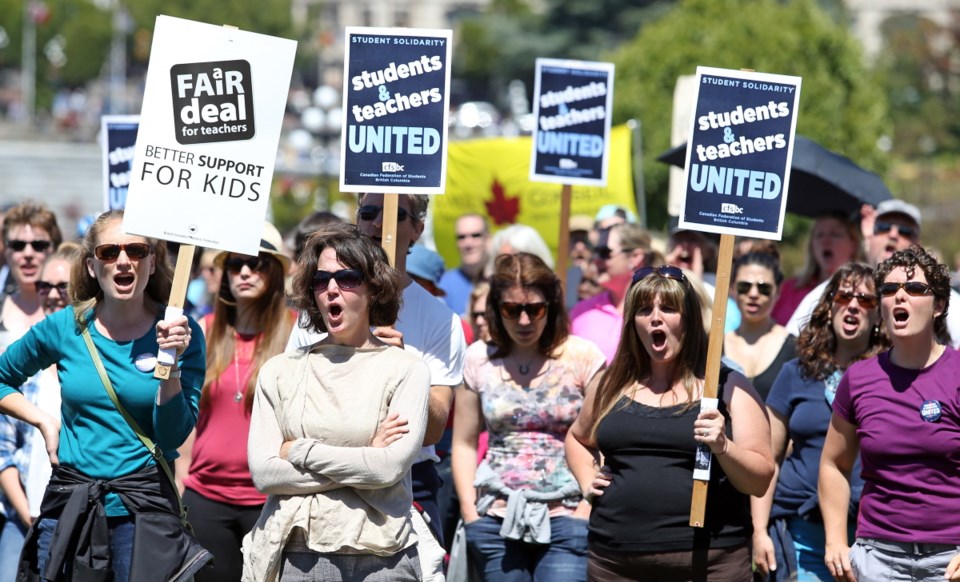Thousands of B.C. students will not be getting report cards for this school year and provincial exams are being modified to make them easier to mark as teachers begin the second week of their full strike.
Report cards have not been deemed an essential service, so teachers will not be required to complete them. Provincial exams were declared as essential, with teachers required to invigilate, but not mark, the Grade 10 and 11 provincials.
“Based on concerns raised by a number of superintendents related to quality and validity of the marking for Social Studies 11 and English 10, the decision has been taken to alter the sections that students will be responsible for completing related to these two exams,” a letter to superintendents from a deputy education minister says. The changes mean students will mostly complete only multiple choice answers rather than written sections of these exams, making it easier to mark the exams.
As far as final marks are concerned, the Labour Relations Board ruled Friday that the most recent Grade 10 and 11 marks would be reviewed by the classroom teachers, who must report any changes to the district. In effect, this means that Grade 10 and 11 marks would stand as of the last date that marks were entered into the computer reporting system, unless the teacher adjusts them.
Whether or how those grades will be communicated to parents remains up in the air, but the superintendent of schools in Surrey, B.C.’s largest district, said in a letter that report cards are not possible under a full strike.
“Unless there is some small miracle, the school year does seem to be all but over with the exception of writing the remaining provincial exams,” Jordan Tinney says in a letter to parents. “The information that we need to produce report cards is in the hands of teachers and they are on strike. The support staff we normally have to help us develop and print report cards are also honouring the picket lines and are not at work.”
With no end in sight to the labour dispute, teachers tried Monday to find another mediator, after their first choice Vince Ready, said he was “too busy” and declined the job on Sunday.
B.C.’s teachers launched their provincewide strike last week, after 16 months of failed negotiations. The two sides are within one per cent on their wage offers. The government is offering seven per cent over six years, the union wants eight per cent over five years. The BCTF wants a $5,000 per teacher signing bonus and the government is offering $1,200.
The union is also seeking:
• A $225 million annual fund to hire new teachers and deal with class size and composition issues, after winning a B.C. Supreme Court case this year that said the government had illegally stripped the right to bargain class size and composition issues from the teachers’ contract in 2002.
• Another $225 million fund to deal with retroactive grievances by members, as well as to pay for improved medical benefits, professional development and preparation time.
The government is offering to continue a $75 million Learning Improvement Fund, and says it can’t afford the BCTF’s terms.
A one per cent increase in total teacher compensation (salary and benefits) costs approximately $30 million per year, the Ministry of Education says.
In the strike so far, the employer has saved $122.4 million, $48 million due to four stage one closure days, $60 million due to five full strike days and $14.4 million due to a 10 per cent pay cut imposed before the full strike. If schools remain closed through the end of June, total savings will be more than $168 million.



